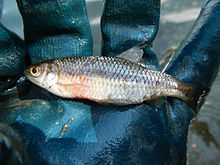| Leucos | |
|---|---|
 | |
| Leucos aula | |
| Scientific classification | |
| Domain: | Eukaryota |
| Kingdom: | Animalia |
| Phylum: | Chordata |
| Class: | Actinopterygii |
| Order: | Cypriniformes |
| Family: | Leuciscidae |
| Subfamily: | Leuciscinae |
| Genus: | Leucos Heckel, 1843 |
| Type species | |
| Squalius aula Bonaparte, 1841 | |
Leucos is a genus of fishes in the family Leuciscidae, from Southern Europe. They are a taxon which is closely related to the genus Rutilus , and were only recently taxonomically distinguished from that genus. [1]
Molecular data suggest that Leucos diverged from Rutilus more than five million years ago, probably during the Messinian salinity crisis. The species of Leucos are typically of small size and they all live in still waters. They differ from Rutilus by the lack of spinous tubercles on scales and head in reproductive males, and also in the pharyngeal teeth formula. [1] The sister group to Leucos is the monotypic Sarmarutilus . [1]